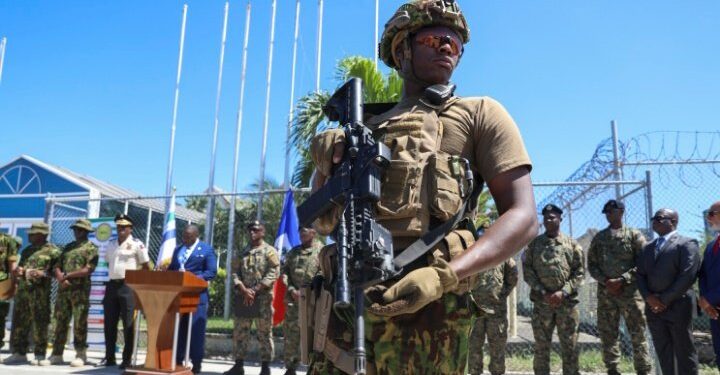The conclusion of the Kenya-led Multinational Security Support Mission in Haiti has been greeted by the same political divide at home as it faced at its onset.
The mission and its transition has given opposition politicians fresh ammunition against the Kenya Kwanza administration.
Critics called for the troops to be brought home and resources diverted to pressing domestic security needs.
Opposition figures, legislators and officials who served in the Kenya Kwanza administrationhave criticised the venture, and opposed Kenya’s inclusion in the succeeding mission, the Gang Suppression Force.
Among the fierce critics of the mission is former vice president and two-time Foreign Affairs minister Kalonzo Musyoka.
Kalonzo has on various occasions and platforms criticised Kenya’s decision to deploy in Haiti saying it was misadvised.
“The mission was misadvised and it did not even in its initial stages get a nod of the UN Security Council, and without it, it was a mission impossible,” Kalonzo said in a recent TV interview.
Kalonzo reiterated his position on Sunday at the Jesus Exaltation Centre in Orkinos, Olooloitikosh, Kajiado county. Three Kenyan officers died during the mission.
“In the spirit of leadership and service, we must condemn the reckless decisions that put our young men in danger in Haiti. We want our boys back,” Kalonzo added.
His counterpart in the United Opposition and former Defence CS Eugene Wamalwa has also weighed in on the matter saying the deployment was unconstitutional.
“Kenya and law-abiding citizens such as Eugene Wamalwa and Kalonzo Musyoka, who respect the rule of law, have never and will never support unconstitutional deployments of our officers carried out in defiance of, and in violation of, court orders as was the case with the Haiti mission,” Wamalwa said.
As far back as November last year, Wamalwa — who also served as a Constitutional Affairs minister — had called for the withdrawal of Kenyan police officers from Haiti.
Wamalwa said following Donald Trump’s win as US president, officers in Haiti should be sent back to Kenya to deal with issues such as abductions and femicide.
“The fate of the Haiti mission after Trump’s victory should be to push for defunding and replacement of the US/Kenyan lead Mission by UN-led and funded mission and return of Kenyan officers home to deal with rising insecurity, abductions, and forced disappearing test, femicide and extrajudicial killings,” Wamalwa wrote on X.
The opposition to the mission has also been shared by Senate Majority whip Boni Khalwale, saying that the Kenyan mission had effectively come to an end as the UN ushers in the new force.
“Was it an ego trip at the cost of the lives three Kenyans?” Senator Khalwale (UDA) posed, as he recalled his earlier remarks in 2023.
“Haiti is 12,119 km away it takes 13 hours of flying to reach Haiti and the cheapest flight costs Ksh220,700. Given these statistics what are the benefits and intended consequences the Government hopes to achieve by taking our troops to Haiti?”Khalwale had posed.
Former presidential adviser Moses Kuria has also termed the mission as a misadventure and a personal decision by Meg Whitman, the former US ambassador to Kenya.
“The fact that the Trump Administration admitted during the special UN session on Haiti that MSS lacks a broad mandate backed by a strong UN Resolution is just a tip of the iceberg. Ambassador Meg Whitman literally ruled Kenya for two years.
“The Haiti mis-adventure was one of the many personal decisions that she took. Anthony Blinken was hapless in her wake. Kenya will continue paying the price for terrible Meg’s reign of terror for a long time to come. Rest in peace Benedict Kabiru and your two fallen comrades,” Kuria said on X.
The former CS added that with the UN Security Council’s resolution to set up a Gang Suppression Force in Haiti, the Inspector General of Police to deploy the returning forces to the streets of Nairobi to put an end to the daylight muggings and pickpocketing.
The UN resolution that transformed the Kenya-led Multinational Security Support mission into a larger Gang Suppression Force was approved amid international debate about mandate, funding and oversight. The new force authorized up to 5,500 personnel with expanded powers to arrest and use force .
However, the government remains adamant that the deployment was necessary as part of its international peace obligations.
While it is not clear the manner in which Kenya will deploy, Foreign Affairs PS Korir Sing’oei told the Star that “These are policy decisions that have yet to be made but will be made in due course”.
Kenya has welcomed the resolution and transition, saying it will be a pivotal shift towards restoring peace and stability in the war-torn Caribbean nation.
“It also reflects the impact of Kenya’s leadership in mobilizing international attention, forging consensus, and catalysing collective action when others hesitated,” it said in a statement.














